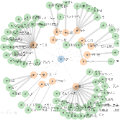Knowledge graph completion (KGC) aims to predict missing facts in knowledge graphs (KGs), which is crucial as modern KGs remain largely incomplete. While training KGC models on multiple aligned KGs can improve performance, previous methods that rely on transferring raw data among KGs raise privacy concerns. To address this challenge, we propose a new federated learning framework that implicitly aggregates knowledge from multiple KGs without demanding raw data exchange and entity alignment. We treat each KG as a client that trains a local language model through textbased knowledge representation learning. A central server then aggregates the model weights from clients. As natural language provides a universal representation, the same knowledge thus has similar semantic representations across KGs. As such, the aggregated language model can leverage complementary knowledge from multilingual KGs without demanding raw user data sharing. Extensive experiments on a benchmark dataset demonstrate that our method substantially improves KGC on multilingual KGs, achieving comparable performance to state-of-the-art alignment-based models without requiring any labeled alignments or raw user data sharing. Our codes will be publicly available.
翻译:暂无翻译




